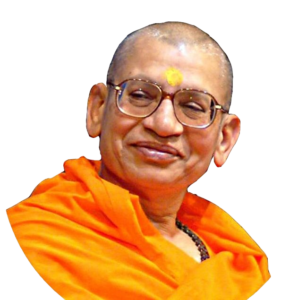
Spirituality: Judging results based on expectation causes pain
By Swami Viditatmananda Saraswati*
Na Me Bhaktaḥ Praṇaśyati – 13
Judging results based on expectation causes pain! On the other hand, if I look upon isvara, the giver of results, as an adversary, then my whole attitude in life will be different. I will think, “What is this? Why is he punishing me? I don’t deserve this.” All kinds of complaints naturally arise. If the unpleasant, painful, or so-called punishment comes, we resist, we react, we reject. We might complain, “Why should this happen to me?” because we expect that things should happen as we want them to happen. If things don’t happen the way we want them to happen, we feel a sense of injustice and we feel that we are victimized. All these reactions arise when we demand that things should happen as we want them to happen.
It is not very likely that what happens will always conform to our expectations or desires. What happens can be sometimes in keeping with what we want or very often not in keeping with what we want. How will we respond?
If what happens is in keeping with what we want, we normally respond with elation, with happiness. Happiness at what? In my mind, I congratulate myself, “I did it. I accomplished it. I am successful.” Ego is involved, because I consider myself to be the author of that outcome, and therefore I take the credit for the favourable results. That is what makes me happy.
On the other hand, if things happen the other way around, I feel frustrated. Either I feel a victim of others or I blame myself. As a victim, I lament that “I did everything possible and even so, see what happened to me!” In that case, I blame and get angry at others, whom I consider responsible for my not getting what I want. Sometimes I blame myself, feeling that “I am no good. I am a failure.” In that case, I consider myself responsible for the unfavourable outcome and I get frustrated and angry with myself. It affects my self-esteem and self-confidence. That also is painful.
A life of judging everything according to my expectations and demands is a life full of pain and conflicts. We create pain by judging what happens based on the ego. We have a need for the satisfaction of the ego. If the ego is satisfied, then the outcome is right; if the ego is not satisfied, then the outcome is wrong. If the ego is satisfied, I am happy. If the ego is not satisfied, I am upset with somebody or upset with myself. This is called saṁsara, and this is a never winning game because what will happen is always unpredictable.
If my sense of well-being depends upon things happening to my requirement, then I am always apprehensive because I never know whether what will happen will fulfil my desire or not. If my sense of well-being is surrendered to the events, that means that the events decide whether I feel well or not.
If they oblige me and make the outcome favourable to me, then I feel happy. If they do not oblige me and things happen the way I do not want them to, I become unhappy. Therefore, I have surrendered my well-being to these unpredictable events.
Devotion is seeing grace in the results of actions
By a change of attitude, I can surrender to isvara and say that whatever happens, I am happy. It is a matter of attitude. I do not insist that whatever happens must be the way I want it. I have resolved that whatever happens should happen as isvara wants it, and therefore what he wants is what I want. Right now, my demand is that he should do what I want him to do. Turn that around and say that I want what he wants.
When you go to a physician, you don’t demand that she give you the sweet-tasting medicine. You have to trust that even though she gives you bitter medicine, it is meant for your well-being. The bhakta says to isvara, “You decide,” then the bhakta has no responsibility for the result. “Isvara’s decision is my decision.” This is called surrender. Surrender is a very important element of devotion because when I am devoted to isvara, I am surrendered to him; I have trust in him. A bhakta’s attitude is that whatever isvara says or does is right.
How I look at life is a matter of attitude, that is all. Whatever is happening at every moment is all karma-phala, the result of actions performed by me in the past. If karma-phala comes from isvara, then in every moment, whatever I confront is created or given to me by isvara. Then what is my attitude? If it is unpleasant, do I reject it? When I say something is unpleasant, understand that I have branded it as unpleasant.
When I am standing on one end of the court and the ball falls far away from me, I can brand it as the mischief of the other player to punish me, or I can look upon it as his intention to train me. All of this is a matter of how we look at things.
The bhakta has his own way of looking at results. A bhakta looks upon isvara as his trainer or his physician. “Isvara is my well-wisher and it can never be that he wants to punish me or in any way make me unhappy. He always wants me to grow. He only wants to train me or make me well. Whatever happens, it is always isvara’s grace and his blessing.” This is the attitude of the bhakta. It begins as nothing but faith.
This attitude of devotion is something to be discovered over time. We start with faith, pending discovery. Lord Krishna says, “ma sucaḥ, don’t worry,” meaning that you will discover this. But you will never discover it unless you put forth the effort. Bhakti is a constant effort to make oneself fit for receiving isvara’s grace.
In bhakti we depend upon him; we are surrendered to him. We appeal to him to help us do what is required and we receive the results as his grace. On my part, I must become a worthy recipient of his grace; that is required. For me to illuminate my house, I should open my window shades to let the sunlight stream in. Similarly, I open these doors of my heart for his grace to flow into my life. Devotion is dwelling on isvara.
…to continue
*Swami Viditatmananda Saraswati has been teaching Vedānta Prasthānatrayī and Prakaraṇagranthas for the last 40 years in Ahmedabad, Gujarat. Throughout the year, he conducts daily Vedānta discourses, accompanied by retreats, and Jñāna Yajñas on Vedānta in different cities in India and foreign countries.






